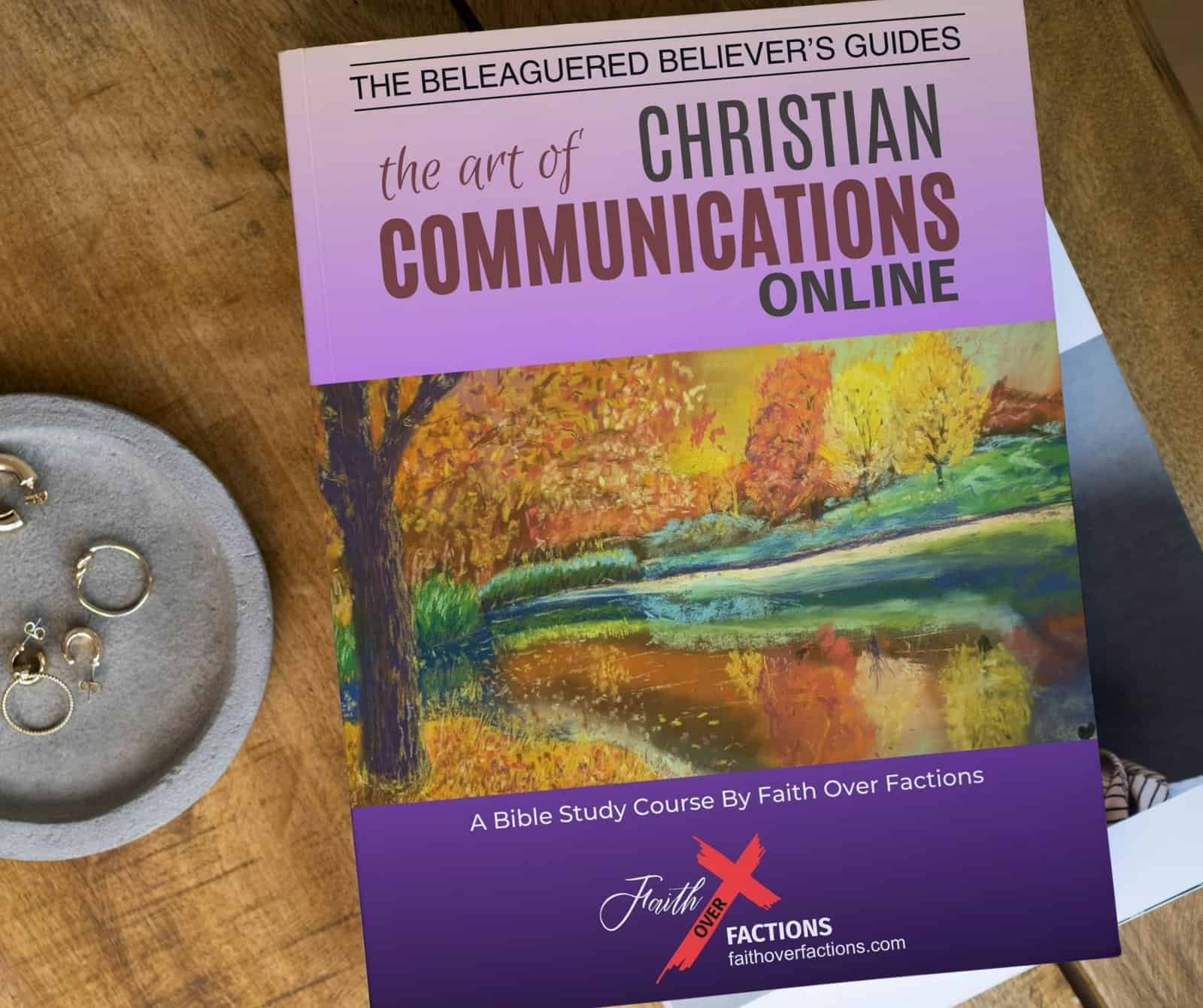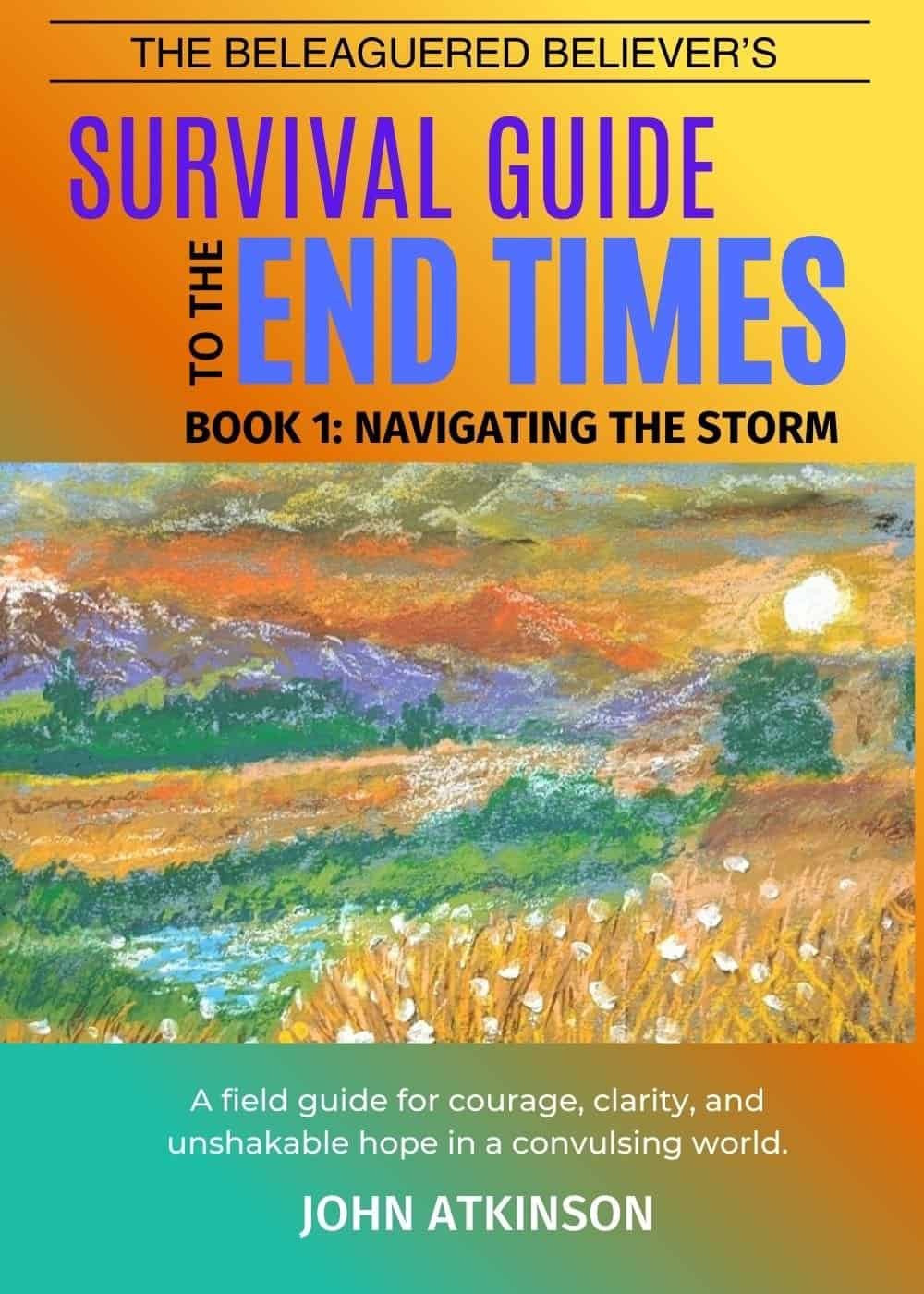
The Modern Addiction We Don't Call Addiction
It starts innocently—just a quick check of the headlines. But soon you're knee-deep in tragedy, outrage, and conflict. One story leads to another, and before you know it, you've scrolled through war zones, political meltdowns, climate disasters, and cultural collapse—all before breakfast. The scroll never ends, and neither does the anxiety.
Sound familiar? You're not alone. Studies show that 16.5% of Americans engage in doomscrolling—the compulsive consumption of negative news—and that number spikes to over 27% during crisis periods. But here's what the research doesn't tell you: this habit isn't just stealing your time. It's reshaping your soul.
We tell ourselves we're just staying informed. But information without peace becomes poison. Bad news becomes our daily diet, and fear becomes strangely familiar—an uninvited companion we've learned to tolerate. What we consume with our eyes begins to shape our inner world. The heart tightens. The mind races. Joy becomes elusive.
Today we'll explore why we're drawn to this pattern—why it feels oddly comforting to immerse ourselves in the world's worst—and what it's doing to our hearts, minds, and faith. More importantly, we'll discover how Scripture offers a different rhythm. Not one of denial or disconnection, but of deliberate renewal. A better way to think. A better way to live.
When Paul Wrote from Prison: Ancient Wisdom for Modern Scrolling
The Original Context of Philippians 4:8
Paul wrote these words from prison—a place of isolation, restriction, and injustice. He wasn't speaking from the comfort of peace, but from the reality of persecution. The early church faced violence from Roman authorities, division within their communities, and the constant pressure of survival in an empire that saw their faith as a threat.
And yet, Paul's instruction to the Philippians wasn't to fixate on the crisis around them. It wasn't to endlessly analyze the injustices or brace for the next wave of hardship. His invitation was far more radical: to choose a different mental diet.
"And now, dear brothers and sisters, one final thing. Fix your thoughts on what is true, and honorable, and right, and pure, and lovely, and admirable. Think about things that are excellent and worthy of praise."
— Philippians 4:8 (NLT)
This wasn't denial—it was discipline. Not a rejection of reality, but a redirection of focus. Paul knew that what fills the mind eventually forms the soul. So he urged the church to dwell on what is true, honorable, right, pure, lovely, and admirable—not because the world lacked darkness, but because we don't fight darkness by staring deeper into it. We resist by holding fast to the light.
Then and Now—Drawing the Parallel
The world of the early church was anything but peaceful. Believers lived under the boot of Roman occupation, where corruption was embedded into law, executions were public spectacle, and allegiance to Christ was seen as treason. Following Jesus meant risking livelihood, community standing, and sometimes life itself.
Fast-forward to today. The scroll of tragedy and outrage runs 24/7—right in our pockets. We don't have to live under Roman tyranny to feel overwhelmed. Our oppression comes by information overload, chronic disillusionment, and a thousand flashing headlines that whisper: "The world is falling apart."
The tools may have changed, but the spiritual stakes are the same.
Every moment, our attention is being contested. The world shouts for our focus. Christ whispers for our renewal. The battlefield is our mind, and the weapon of resistance is not knowledge alone—but wisdom rooted in Christ.
Paul's world had plenty of reasons to panic. But his message wasn't shaped by headlines. It was shaped by heaven.
The Neuroscience of Doomscrolling: Why We Can't Look Away
How Your Brain Gets Hijacked
Modern psychology reveals why doomscrolling feels so compelling—and so exhausting. Every startling headline triggers a hit of dopamine, your brain's reward signal. That micro-rush trains you to seek the next jolt, even if it spikes anxiety.
But there's more happening beneath the surface:
Your brain has a negativity bias. For thousands of years, humans survived by detecting threats—the rustling in the bushes, the predator on the horizon. Your ancestors who ignored danger didn't pass on their genes. So your brain evolved to prioritize bad news over good news at a ratio of about 5:1.
The problem? That same mechanism that kept us alive in a world of physical predators now keeps us scrolling through digital threats we can't actually fight or flee from. Your amygdala (the brain's threat-detection center) doesn't distinguish between a lion in the grass and a catastrophic headline on your phone. It just sounds the alarm.
Over time, repeated exposure to alarming content creates what researchers call "chronic vigilance"—a state where your nervous system remains on high alert, constantly scanning for the next threat. The brain links distressing content with a sense of preparedness. We feel informed, but we're being conformed—shaped into reactive, restless people rather than reflective disciples.
This isn't moral failure. It's biological hijacking that requires spiritual discipline to override.
The Illusion of Control
Here's the paradox: doomscrolling promises security—"If I just know everything, I can handle anything." Yet the opposite happens. Our peace erodes, our pulse quickens, and our prayers falter.
The early church faced political upheaval too, but Paul urged them to "fix your thoughts" on what is honorable and lovely (Philippians 4:8). In other words, knowledge devoid of wisdom does not safeguard the soul; it suffocates it.
As C.S. Lewis observed, "The future is something which everyone reaches at the rate of sixty minutes an hour, whatever he does, whoever he is." Doomscrolling cannot control tomorrow; it can only corrupt today.
Spiritual Deformation: What Happens When Fear Becomes Functional Theology
When Bad News Becomes Your Default Setting
A.W. Tozer warned, "What comes into our minds when we think about God is the most important thing about us." If our mental horizon is dominated by fear, then fear—not faith—becomes our functional theology.
When you wake up and immediately check the news, you're making a liturgical choice. You're establishing what voice gets first access to your mind. And that first voice sets the emotional and spiritual tone for everything that follows.
The neglected heart will soon be a heart overrun with worldly thoughts; the neglected life will soon become a moral chaos. — A.W. Tozer
Scripture never denies evil, but it refuses to enthrone it. We are commanded to "set our minds on things above" (Colossians 3:2) and to guard the heart "above all else" (Proverbs 4:23). This disciplined redirection is not escapism; it is resistance.
John Stott reminds us that the Word of God must "confront us, disturb our security, and reshape our thinking." We fight darkness by feasting on light—meditating on truth until it becomes the default setting of the soul.
The Call to Be Transformed, Not Just Informed
This is where Paul's words in Romans 12:2 become urgent:
"Don't copy the behavior and customs of this world, but let God transform you into a new person by changing the way you think. Then you will learn to know God's will for you, which is good and pleasing and perfect."
— Romans 12:2 (NLT)
Notice the verb—be transformed—is passive in Greek. It means the work is something God does to us when we surrender to Him. We don't renew our minds by sheer willpower alone. We allow the Spirit to rewire what the scroll has disordered.
As Dallas Willard once wrote: "The transformation of the inner life is the greatest need of the human race."
But transformation requires cooperation. It requires that we stop feeding the anxiety machine and start feeding our souls.
But Don't I Need to Stay Informed? Wisdom vs. Overwhelm
Addressing the Objection Directly
This is the question beneath the question for many of us: "If I stop doomscrolling, won't I be irresponsible? Naive? Unprepared?"
Let's be clear: God doesn't call us to ignorance. He doesn't ask us to be uninformed about the world we're called to serve. But there's a massive difference between responsible awareness and compulsive consumption.
Responsible awareness:
- Has boundaries (specific times, trusted sources)
- Leads to prayer, action, or rest—not paralysis
- Leaves you informed AND at peace
- Makes space for God's voice alongside human reporting
Compulsive consumption (doomscrolling):
- Has no off switch (anytime, all sources, always)
- Leads to anxiety, despair, or numbing
- Leaves you overwhelmed AND immobilized
- Drowns out God's voice with human panic
The question isn't whether you should be informed. The question is: How much news is enough? Which sources build wisdom rather than fear? And when does information-gathering become soul-depleting?
The Wisdom of Discernment
Proverbs 4:23 tells us: "Guard your heart above all else, for everything you do flows from it." (NLT)
"Guarding" implies selectivity. Not everything that can enter your mind should enter your mind. Not every tragedy is yours to carry. Not every crisis is yours to solve. Not every headline is yours to absorb.
This is where discernment becomes practical—not just a spiritual platitude but actual wisdom about:
- Which news you consume
- How much you take in
- When you engage it
- What you do with the information afterward
You can stay informed without being enslaved. You can be aware without being anxious. You can engage the world without letting the world colonize your interior life.
What We Risk When We Don't Break the Cycle
The Hidden Costs of Chronic Doomscrolling
Let's name what's actually at stake here:
- Your relationships suffer. When you're chronically anxious, you bring that tension into every conversation. Your spouse asks how your day was, and you launch into a recap of global catastrophes. Your kids need your presence, but your mind is still processing political drama. Anxiety is contagious—and you become a carrier.
- Your witness weakens. The world is full of despairing secularists who doom-scroll without hope. If followers of Jesus are indistinguishable from them—scrolling the same feeds, carrying the same worry, exhibiting the same exhaustion—what makes our faith compelling? Our peace should be conspicuous. Our hope should be strange.
- You miss what God is doing. When your attention is colonized by outrage, you lose sensitivity to the Spirit's gentle movements. The still, small voice can't compete with push notifications. The nudge toward compassion gets drowned out by algorithmic urgency. You become so focused on what's going wrong that you miss what God is doing right.
- Your soul shrinks. This might be the deepest cost. Constant exposure to worst-case scenarios trains you to expect catastrophe. Your capacity for wonder diminishes. Your gratitude atrophies. Your imagination for God's goodness narrows. The soul that should be expanding into joy, hope, and love begins to contract into suspicion, dread, and self-protection.
This is spiritual formation in reverse. And it happens scroll by scroll, headline by headline, day by day.
Practical Moves of Faith: How to Actually Break the Cycle
1. Recognize the Pattern
Every habit starts with a reward loop—what does doomscrolling give you? A sense of control? False preparedness? A distraction from deeper worries?
Be honest: After a long scroll session, do you feel more at peace—or more panicked?
Naming the emotional aftermath is the first act of reclaiming your mental space. Bring the pattern into the light so it can no longer operate in the shadows.
"Search me, O God, and know my heart; test me and know my anxious thoughts."
— Psalm 139:23 (NLT)
2. Reframe Your Input: Let God Set the Tone
What if the first voice you heard each morning wasn't the headlines, but the heart of God?
Before opening your news app or scrolling your feed, open Scripture.
Choose a Psalm. Sit with one line. Let it frame your attention, your reactions, your lens. The world is loud, but God still whispers. Let Him set the tone for your day.
"Let me hear of your unfailing love each morning, for I am trusting you."
— Psalm 143:8 (NLT)
This is liturgical resistance. You're declaring that your mind belongs to Christ before the world tries to claim it.
3. Set a Limit—Then Replace It
Breaking a habit without replacing it rarely works. Instead of simply avoiding your scroll time, use that space to feed your soul:
Replacement practices:
- Read one Psalm before checking the news
- Step outside and take five deep breaths—let the air remind you that God is still holding the world
- Send a text of encouragement to someone—replace passive intake with active compassion
- Put on a worship song—let truth be louder than trouble
- Journal one thing you're grateful for—train your brain to notice light, not just darkness
We are always being formed. What we put in will eventually overflow. Choose inputs that cultivate peace, not panic.
4. Pray for Discernment (Use This Prayer)
Not all bad news is yours to carry. Some stories are meant to call us to prayer or compassion—but not everything is yours to solve, share, or shoulder.
Invite God to be your filter:
Prayer:
"Lord, show me what I need to know—and free me from what I don't. Help me distinguish between conviction and compulsion, between Your leading and my anxiety. Guard my heart. Renew my mind. Anchor me in Your peace that surpasses understanding. Amen."
Discernment is one of the quietest miracles of grace.
More Light for the Journey: Scripture to Guide You
Isaiah 26:3 (NLT)
"You will keep in perfect peace all who trust in you, all whose thoughts are fixed on you!"
→ Peace isn't about perfect circumstances. It's about where your thoughts are fixed.
Matthew 6:22-23 (NLT)
"Your eye is like a lamp that provides light for your body… but when your eye is unhealthy, your whole body is filled with darkness."
→ What you focus on will shape your whole self.
2 Corinthians 10:5 (NLT)
"We capture their rebellious thoughts and teach them to obey Christ."
→ Doomscrolling must be confronted as a mental habit that can be brought under the authority of Jesus.
Psalm 119:37 (NLT)
"Turn my eyes from worthless things, and give me life through your word."
→ Ask God to help you shift your gaze to what truly brings life.
Colossians 3:2 (NLT)
"Think about the things of heaven, not the things of earth."
→ This isn't escapism—it's strategic focus on what's eternal and true.
Let's Walk This Out Together: A Closing Invitation
The world is heavy—and pretending it's not doesn't help. Denial isn't discipleship. But neither is despair.
Letting the weight of the world consume us does not glorify God; it deforms our hearts, shortens our attention, and clouds our hope. We were not created to carry the sorrow of every nation, every hour, every scroll. That burden belongs to Christ.
God doesn't call us to ignorance. He calls us to wisdom. To discernment. To peace that surpasses understanding (Philippians 4:7). He invites us not to escape the world, but to live within it as salt and light, anchored and undisturbed, even as the storm rages around us.
Every scroll is an invitation: will we be formed by chaos, or by Christ?
It's time to stop letting the scroll steal our serenity. It's time to retrain our gaze—to re-center on what is true, pure, and praiseworthy (Philippians 4:8). In a world that rewards urgency and outrage, the Spirit calls us to stillness, clarity, and courage.
As Henri Nouwen once wrote:
"In the midst of a turbulent, often chaotic life, we must keep returning to the center—that quiet, still place where God dwells."
That center is not found by scrolling faster. It's found by stopping—breathing—and remembering whose voice deserves first access to your heart.
Let's begin there.
Journaling Prompts: Fixing Your Focus
Not everyone processes through pen and paper—and that's perfectly fine. Journaling isn't the only path to reflection; it's just one tool among many.
If traditional journaling feels forced or uncomfortable, consider these alternatives:
Voice memo reflection: Open your phone's voice recorder and talk through the prompts out loud. Sometimes speaking reveals what writing hides.
The goal isn't to fill pages—it's to fix your thoughts on what is true, lovely, and worthy of praise (Philippians 4:8). Whatever method gets you there is the right one.
Choose what resonates. Skip what doesn't. The Spirit meets you where you are.
- Walk and pray: Take the questions with you on a walk. Let your feet move while your mind processes. Physical movement often unlocks spiritual insight.
- Talk it through: Share the prompts with a trusted friend, spouse, or small group. Thinking out loud in community can surface truths you'd miss alone.
- Draw or doodle: Visual processing is just as valid. Sketch what comes to mind. Use colors, symbols, or shapes to represent your thoughts.
- Simply sit and think: Some of the deepest reflection happens in silence. Read the prompt, then just sit with it. Let God speak without you needing to produce anything.
Prompt 1: When do you find yourself most likely to doomscroll?
Is it in moments of boredom? Of fear? When you feel out of control? Pay attention to the emotional doorway that leads you there.
Prompt 2: What would it look like to pause in that moment—redirect your thoughts—and re-center in Christ?
Imagine what might change if your first response was to breathe, pray, or open the Psalms instead of opening your phone. What would that do to your peace?
Prompt 3: What's one story you've been carrying that isn't yours to solve?
Bring it to God in prayer. Ask Him what—if anything—He's calling you to do. Then practice releasing it.
Footnotes & References
[1] McNally, S.A. "Digital Doom: How Negative News Activates the Reward Circuit." Journal of Behavioral Neuroscience 42, no. 3 (2024): 215–228.
[2] Tozer, A.W. The Knowledge of the Holy. Harper, 1961.
[3] Lewis, C.S. The Screwtape Letters, Letter 15. HarperOne, 1942.
[4] Stott, John. Basic Christianity. IVP, 1958.
[5] Willard, Dallas. The Divine Conspiracy: Rediscovering Our Hidden Life in God. HarperOne, 1998.
[6] Nouwen, Henri J.M. Making All Things New: An Invitation to the Spiritual Life. HarperOne, 1981.
Frequently Asked Questions
Start by identifying your triggers—when do you reach for your phone to scroll bad news? Replace that moment with a healthier practice: read Scripture, pray, take a walk, or text encouragement to someone. Set time limits on news apps and turn off push notifications.
Doomscrolling itself isn't listed as a sin in Scripture, but the pattern can reflect—and reinforce—sinful habits like anxiety, fear, distrust in God, and neglect of spiritual disciplines. When compulsive news consumption replaces prayer, peace, and trust in God, it becomes spiritually harmful.
The Bible calls us to fix our thoughts on what is true, noble, right, pure, lovely, and admirable (Philippians 4:8). It also commands us to guard our hearts (Proverbs 4:23) and set our minds on things above (Colossians 3:2). This doesn't mean ignorance, but intentional, discerning consumption.
Set boundaries: choose 1-2 trusted news sources, limit consumption to specific times (not first thing in morning or before bed), and always follow news intake with prayer or Scripture. Ask yourself: "Is this informing me or immobilizing me?"
Staying informed has boundaries, leads to action or peace, and makes space for God's voice. Doomscrolling has no limits, leads to paralysis or panic, and crowds out spiritual sensitivity.







